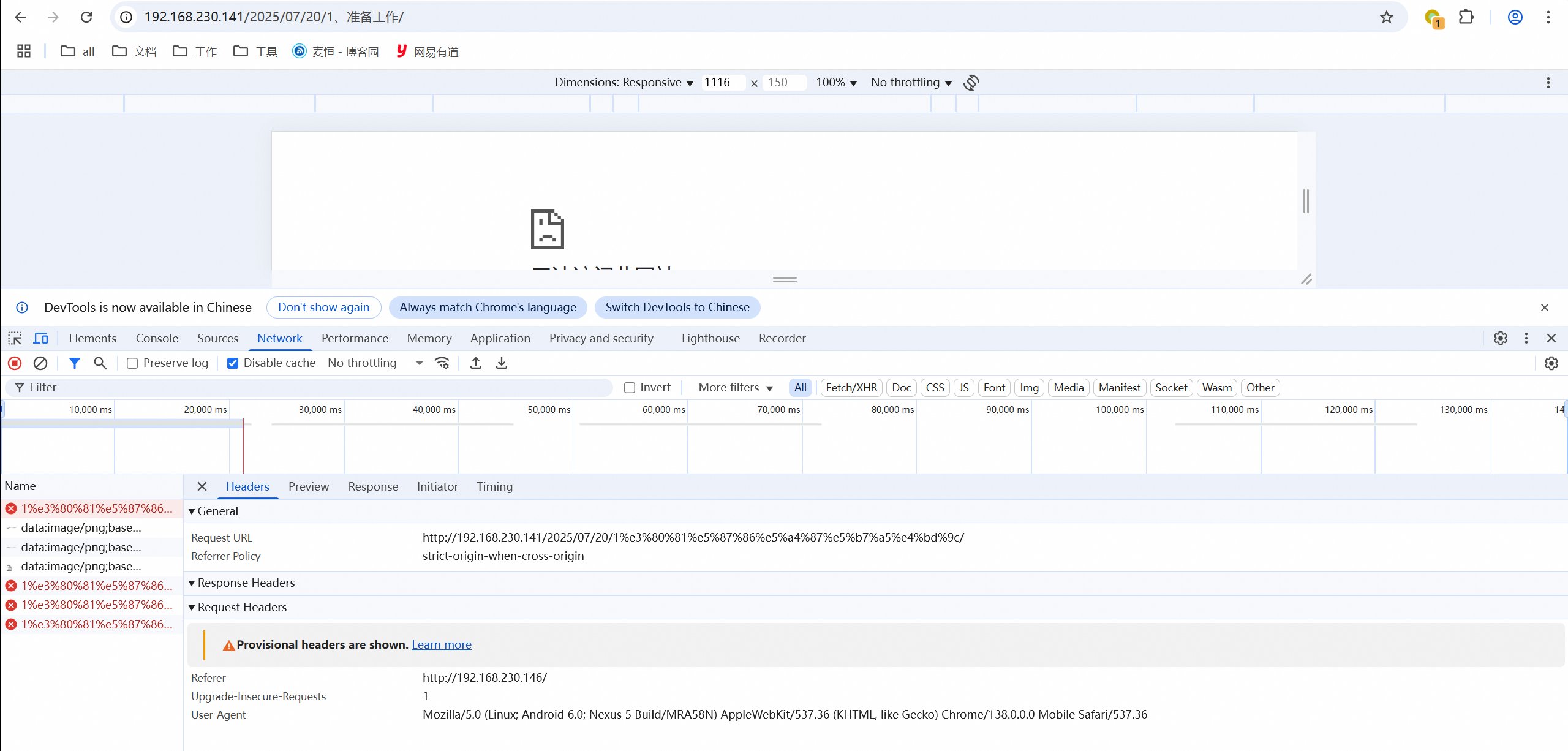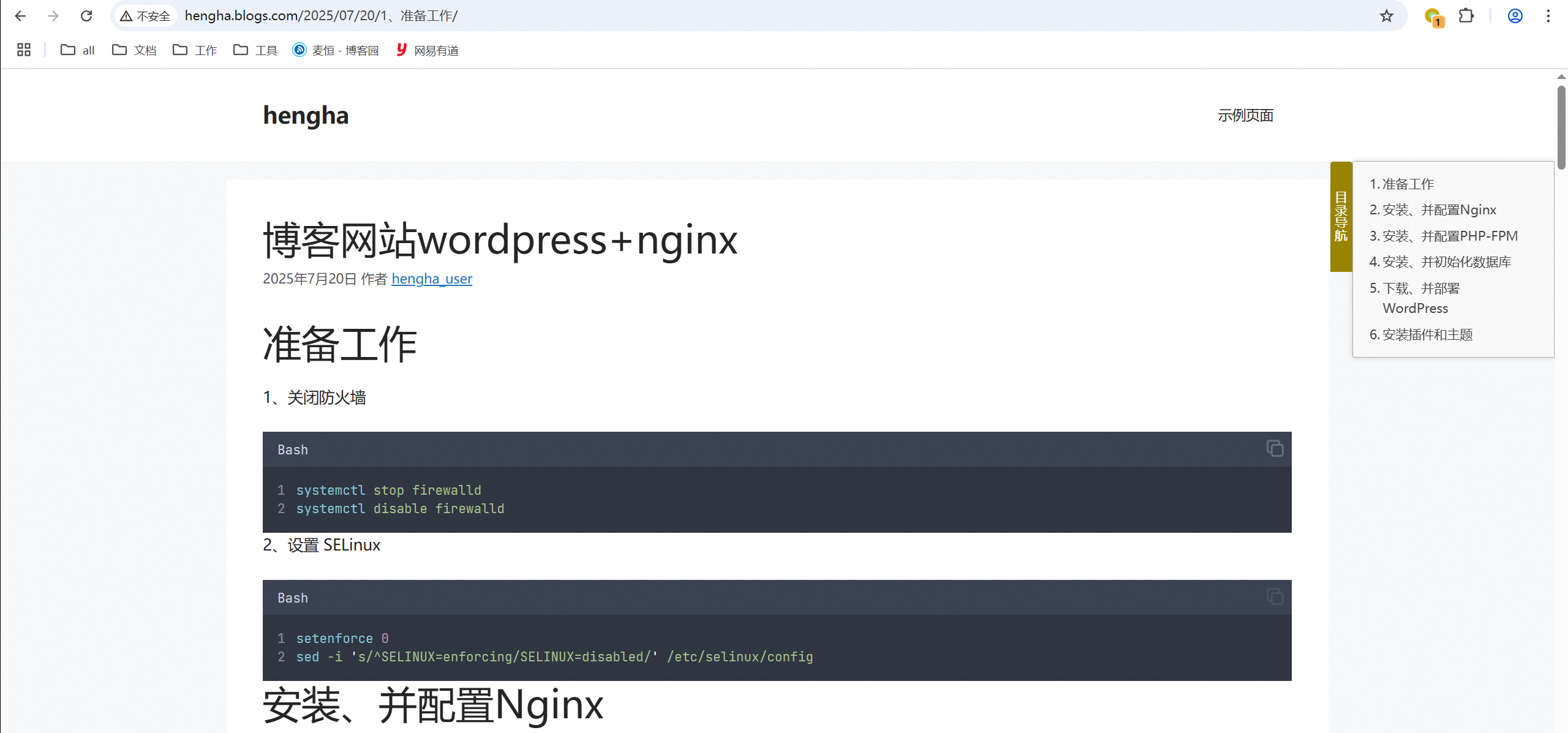博客网站wordpress+nginx
1、准备工作
1、关闭防火墙
systemctl stop firewalld systemctl disable firewalld
2、设置 SELinux
setenforce 0 sed -i 's/^SELINUX=enforcing/SELINUX=disabled/' /etc/selinux/config
2、安装、并配置Nginx
1、安装nginx
yum -y install nginx
2、配置nginx
(1)创建目录
mkdir -p /var/www/wordpress
(2)创建虚拟主机文件
#vim /etc/nginx/conf.d/wordpress.conf
server {
listen 80;
server_name hengha.blogs.com; # 换成你域名/IP
root /var/www/wordpress;
index index.php index.html;
# 伪静态
location / {
try_files $uri $uri/ /index.php?$args;
}
# 处理 PHP
location ~ \.php$ {
include fastcgi_params;
fastcgi_pass 127.0.0.1:9000;
fastcgi_param SCRIPT_FILENAME $document_root$fastcgi_script_name;
fastcgi_index index.php;
}
# 缓存静态文件
location ~* \.(css|js|jpg|jpeg|gif|png|svg|ico|webp)$ {
expires 30d;
access_log off;
}
# 隐藏 .ht*
location ~ /\. {
deny all;
}
}
3、检查并启动nginx
nginx -t systemctl enable nginx systemctl start nginx
3、安装、并配置PHP-FPM
1、安装PHP-FPM
- CentOS 7 默认 PHP 版本过旧,这里用 Remi 仓库。
#装 EPEL + Remi yum -y install epel-release yum -y install https://rpms.remirepo.net/enterprise/remi-release-7.rpm #启用 Remi PHP 8.1(或 8.2,可自选),若无此命令先装 yum-utils yum-config-manager --enable remi-php81 #安装软件 yum -y install php-fpm php-mysqlnd php-opcache php-gd php-mbstring php-xml php-json php-curl php-zip
2、配置PHP-FPM
(1)配置PHP-FPM
#vim /etc/php-fpm.d/www.conf(核心行) user = nginx group = nginx listen = 127.0.0.1:9000 listen.owner = nginx listen.group = nginx
- 查看php-fpm配置

]# grep -Ev '^\s*([;#]|$)' /etc/php-fpm.d/www.conf [www] user = nginx group = nginx listen = 127.0.0.1:9000 listen.owner = nginx listen.group = nginx listen.allowed_clients = 127.0.0.1 pm = dynamic pm.max_children = 50 pm.start_servers = 5 pm.min_spare_servers = 5 pm.max_spare_servers = 35 slowlog = /var/log/php-fpm/www-slow.log php_admin_value[error_log] = /var/log/php-fpm/www-error.log php_admin_flag[log_errors] = on php_value[session.save_handler] = files php_value[session.save_path] = /var/lib/php/session php_value[soap.wsdl_cache_dir] = /var/lib/php/wsdlcache
(2)取消 php-fpm 的 expose header(安全)
echo "expose_php = Off" >> /etc/php.ini
3、启动PHP-FPM
systemctl enable php-fpm systemctl start php-fpm
4、安装、并初始化数据库
1、安装、并启动数据库
- CentOS 7 自带 MariaDB 5.5,WordPress 也可用;若需高版可装 10.x。此处用默认:
# 安装数据库 yum -y install mariadb mariadb-server # 启动数据库 systemctl enable mariadb systemctl start mariadb # 设置 root 密码、删除测试库等 mysql_secure_installation
2、初始化数据库
# 登录数据库 mysql -u root -p # 创建 WordPress 数据库和用户 CREATE DATABASE wordpress DEFAULT CHARACTER SET utf8mb4 COLLATE utf8mb4_unicode_ci; CREATE USER 'wpuser'@'localhost' IDENTIFIED BY 'StrongPassw0rd!'; GRANT ALL PRIVILEGES ON wordpress.* TO 'wpuser'@'localhost'; FLUSH PRIVILEGES; EXIT;
5、下载、并部署 WordPress
1、下载WordPress
cd /var/www/ # 下载wordpress curl -O https://wordpress.org/latest.tar.gz
2、部署 WordPress
# 解压wordpress tar zxvf latest.tar.gz # 修改wordpress目录的属主属组 chown -R nginx:nginx /var/www/wordpress
3、配置wordpress
# 复制配置文件模版: cd /var/www/wordpress cp wp-config-sample.php wp-config.php # 配置文件模版 #vim wp-config.php define( 'DB_NAME', 'wordpress' ); define( 'DB_USER', 'wpuser' ); define( 'DB_PASSWORD', 'StrongPassw0rd!' ); define( 'DB_HOST', 'localhost' ); define( 'DB_CHARSET', 'utf8mb4' ); define( 'DB_COLLATE', '' );
7、访问wordpress,并初始化
1、配置windows的hosts
- C:\Windows\System32\drivers\etc\hosts

2、通过域名访问wordpress,并初始化
- hengha.blogs.com

6、安装插件和主题
1、插件和主题
# 账密 hengha_user/root@123 # 主题 GeneratePress # 插件 Code Block Pro #代码块 Easy Table of Contents #目录
2、配置目录

(1)配置css
- 外观 → 自定义 → 额外 CSS(或用子主题 style.css)粘贴

/* (目录)将容器固定在右侧中部 */ #ez-toc-container { position: fixed !important; right: 0; top: 100px; /* 视需要调整 */ width: 400px; /* 展开后宽度 */ max-height: 70vh; overflow-y: auto; z-index: 9999; box-shadow: 0 0 6px rgba(0,0,0,.15); transition: transform .3s; border-radius: 3px 0 0 3px; overscroll-behavior: contain; /* 避免滚到最顶后带动页面滚 */ } /* (目录)起始状态隐藏在右侧,只留按钮宽度 */ #ez-toc-container.toc-hide { transform: translateX(400px); /* 根据 width 调整 */ } /* (目录)竖条按钮 */ #toc-toggle-bar { position: absolute; left: -25px; top: 0; width: 24px; height: 120px; writing-mode: vertical-rl; text-orientation: mixed; background: #988300; /* 你想要的金色 */ color: #fff; font-size: 14px; line-height: 24px; text-align: center; cursor: pointer; border-radius: 3px 3px 0 0; } /* (目录)目录项样式 */ #ez-toc-container ul.ez-toc-list li a { font-size: 14px; padding: 2px 2px; } #ez-toc-container ul.ez-toc-list li.active > a { color: #c59d00; /* 当前章节高亮 */ } /* (目录)隐藏默认标题行(可选)*/ #ez-toc-title-container { display:none } /* (目录)如果你只想让列表部分滚,而标题 / 折叠按钮保持可见 */ #ez-toc-container .ez-toc-list{ max-height: 70vh; overflow-y: auto; } /* ───── 目录缩进微调 ───── */ /* ① (目录)先把所有 margin / padding 清零 */ #ez-toc-container ul, #ez-toc-container li{ margin:0 !important; padding:0 !important; } /* ② (目录)再按层级给一点点左缩进(你可以调整 0.6em 这个值) */ #ez-toc-container .ez-toc-list { margin-left:0 !important; } #ez-toc-container .ez-toc-list ul { margin-left:1.2em !important; } /* 二级开始 */ #ez-toc-container .ez-toc-list ul ul { margin-left:1.2em !important; } /* 三级 */ #ez-toc-container .ez-toc-list ul ul ul { margin-left:1.2em !important; } /* 四级 */ /* ③ (目录)如果你想让数字和文字之间再紧一点 */ #ez-toc-container .ez-toc-list li a{ text-indent:0; /* 取消 Easy TOC 里的额外凹进 */ } /* 调正文文字大小 */ body, .entry-content { font-size: 18px; /* 可改 px / em / rem / % */ line-height: 1; /* 建议一并调整行高 */ } /* 只改文章正文区域 */ .single-post .entry-content { font-size: 15px; } /* 修改各级标题 */ h1 { font-size: 1.75rem; } h2 { font-size: 1.5rem; } h3 { font-size: 1.25rem; } h4 { font-size: 1rem; }
(2)配置JS
- 放到子主题 footer.php / 插件

<script> document.addEventListener('DOMContentLoaded', function () { var toc = document.getElementById('ez-toc-container'); if (!toc) return; // 创建竖条按钮 var bar = document.createElement('div'); bar.id = 'toc-toggle-bar'; bar.innerText = '目录导航'; toc.appendChild(bar); // 初始隐藏 toc.classList.add('toc-hide'); // 点击按钮展开/收起 bar.addEventListener('click', function () { toc.classList.toggle('toc-hide'); }); // 滚动时高亮当前章节 let links = toc.querySelectorAll('a'); let sections = [...links].map(a => document.getElementById(a.getAttribute('href').substring(1))); window.addEventListener('scroll', throttle(highlight, 200)); function highlight(){ let i = sections.findIndex(sec => sec.getBoundingClientRect().top > 80); links.forEach(a => a.parentNode.classList.remove('active')); if(i===-1) i = sections.length-1; else if(i>0) i = i-1; links[i] && links[i].parentNode.classList.add('active'); } function throttle(fn,delay){ let t; return function(){clearTimeout(t);t=setTimeout(fn,delay);} } }); </script>
(3)勾选掉

问题
问题1:php-fpm版本低
1、访问时,浏览器报错

2、nginx的error.log中有错误日志
- 2025/08/06 00:11:34 [error] 2759#2759: *1 FastCGI sent in stderr: "PHP message: PHP Parse error: syntax error, unexpected ':', expecting '{' in /var/www/wordpress/wp-includes/compat.php on line 498" while reading response header from upstream, client: 192.168.230.1, server: hengha.blogs.com, request: "GET / HTTP/1.1", upstream: "fastcgi://127.0.0.1:9000", host: "hengha.blogs.com"
3、查看php版本,可以看到版本是5.4,不是8.1+
# php -v PHP 5.4.16 (cli) (built: Apr 1 2020 04:07:17)
4、重新安装php,并配置
5、重启nginx
问题2:需要使用域名搭建网站
1、虚拟机(VMware)ip变了,导致wordpress访问有问题
2、登录界面看着就有问题

3、点击任意文件,IP就变成了之前搭建时的IP。

4、刚开始以为是缓存的问题,但将浏览器缓存清掉(nginx没有缓缓),还是有相同的问题。

5、根据浏览器的返回信息,怀疑是哪里的ip被写死了
- 把 WordPress 站点从 192.168.230.141 迁到了 192.168.230.146,只改了站点 URL(home、siteurl 或 nginx vhost),但文章正文里、特色图片、附件等仍然保存的是旧 IP 的绝对链接。
- 浏览器解析 HTML 时照着写死的 http://192.168.230.141/xxx 去发请求,于是产生了这些红叉。
6、查看数据库 ,可以看到192.168.230.141

7、解决问题
(1)使用域名访问博客,修改nginx配置

(2)修改数据库
USE wordpress; UPDATE wp_posts SET post_content = REPLACE(post_content, 'http://192.168.230.141', 'http://hengha.blogs.com'); UPDATE wp_postmeta SET meta_value = REPLACE(meta_value, 'http://192.168.230.141', 'http://hengha.blogs.com'); UPDATE wp_options SET option_value = REPLACE(option_value, 'http://192.168.230.141', 'http://hengha.blogs.com'); UPDATE wp_usermeta SET meta_value = REPLACE(meta_value, 'http://192.168.230.141', 'http://hengha.blogs.com');
8、访问正常了

问题3:配置js时报错
1、添加js文件时报错

2、问题排查
]# curl -I http://hengha.blogs.com HTTP/1.1 301 Moved Permanently Date: Wed, 23 Jul 2025 10:18:20 GMT Content-Type: text/html Content-Length: 167 Connection: keep-alive Cache-Control: max-age=3600 Expires: Wed, 23 Jul 2025 11:18:20 GMT Location: https://hengha.blogs.com/ Set-Cookie: __cf_bm=nkz84h1JtfsxW1UNpJV1twnduDjoDQUPXXOMKEh_KP8-1753265900-1.0.1.1-d4csggaieYgrpXtDwzhZh0WrUUtth3LO4XfmyXlicnAGNJf0xOlma1Amn4.U5DssVyq2iMKIbyXZD3pMsbZd4o6NH6D_Cu594rB8BN9VX8Y; path=/; expires=Wed, 23-Jul-25 10:48:20 GMT; domain=.blogs.com; HttpOnly Server: cloudflare CF-RAY: 963a6ee70e40d03d-SJC ]# curl -I http://127.0.0.1 HTTP/1.1 200 OK Server: nginx/1.20.1 Date: Wed, 23 Jul 2025 10:18:30 GMT Content-Type: text/html; charset=UTF-8 Connection: keep-alive X-UA-Compatible: IE=edge Link: <http://hengha.blogs.com/index.php?rest_route=/>; rel="https://api.w.org/"
- 服务器访问 http://hengha.blogs.com 时,请求被 Cloudflare 接管并 301 跳到 https;
- 服务器访问 http://127.0.0.1 可以直接拿到 WordPress 正常页面;
- WordPress 的 loop-back 请求默认用「站点地址(https://hengha.blogs.com)」去访问自己,于是:服务器 → Cloudflare → 再回到服务器。
- 这条链路既慢又可能被 Cloudflare 的安全规则拦截,任何 403/5xx/WAF 质询都会让 WordPress 误以为“通信失败”,从而把文件回滚。
- 所以重点是:让服务器在本地就完成 loop-back,而不要兜一圈 Cloudflare。
3、解决问题

问题4:文章过大时:更新失败。 此响应不是合法的 JSON 响应。
- PHP 本身的输入/内存限制
- Web 服务器对请求体的限制(nginx)
- 对大篇幅文章而言,最常见的触发点是 MySQL 的数据包或事务日志大小不足。
1、问题描述
(1)报错1:更新失败。 此响应不是合法的 JSON 响应。


- nginx日志:
- 2025/07/30 19:30:48 [error] 1127#1127: *5456 client intended to send too large body: 1144286 bytes, client: 192.168.230.1, server: hengha.blogs.com, request: "POST /index.php?rest_route=%2Fwp%2Fv2%2Fposts%2F243&_locale=user HTTP/1.1", host: "hengha.blogs.com", referrer: "http://hengha.blogs.com/wp-admin/post.php?post=243&action=edit"
(2)报错2:更新失败。 无法在数据库中更新文章

2、解决问题
(1)修改php.ini,并重启fmp
#vi /etc/php.ini
upload_max_filesize = 64M
post_max_size = 64M ; 必须 ≥ upload_max_filesize
max_input_vars = 10000 ; Gutenberg 会把整篇文章序列化成一个巨大的字段,建议 5 000 – 20 000
max_input_time = 300
max_execution_time = 300
memory_limit = 256M ; 若你的主机内存足够,可设更高
(2)修改nginx配置文件,并重启nginx
client_max_body_size 64m; # 放到 http{} 或 server{} 里
(3)修改MySQL 配置文件,并重启数据库
#vi /etc/my.cnf.d/server.cnf
[mysqld]
max_allowed_packet = 64M
问题5、centos9安装wordpress
#更换yum源 tee /etc/yum.repos.d/CentOS-Stream-9.repo > /dev/null <<'EOF' [baseos] name=CentOS Stream 9 - BaseOS baseurl=http://mirrors.aliyun.com/centos-stream/9-stream/BaseOS/$basearch/os/ enabled=1 gpgcheck=1 gpgkey=file:///etc/pki/rpm-gpg/RPM-GPG-KEY-centosofficial [appstream] name=CentOS Stream 9 - AppStream baseurl=http://mirrors.aliyun.com/centos-stream/9-stream/AppStream/$basearch/os/ enabled=1 gpgcheck=1 gpgkey=file:///etc/pki/rpm-gpg/RPM-GPG-KEY-centosofficial EOF 清理并重新生成缓存: sudo dnf clean all sudo rm -rf /var/cache/dnf sudo dnf makecache #安装 EPEL 和 Remi 源,及 dnf 插件: dnf install -y https://dl.fedoraproject.org/pub/epel/epel-release-latest-9.noarch.rpm dnf install -y https://rpms.remirepo.net/enterprise/remi-release-9.rpm #重置并启用 PHP 的 remi-8.1 模块流: sudo dnf module reset php -y sudo dnf module enable php:remi-8.1 -y
1
# #



 浙公网安备 33010602011771号
浙公网安备 33010602011771号